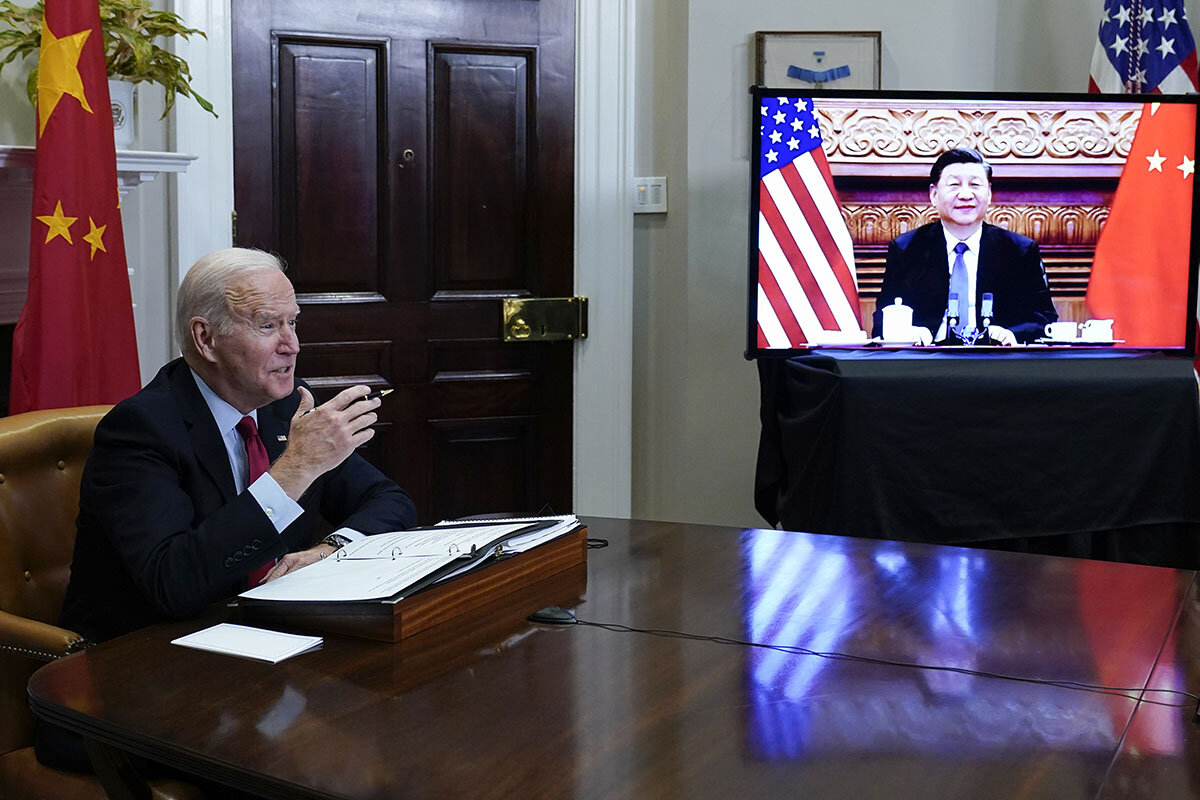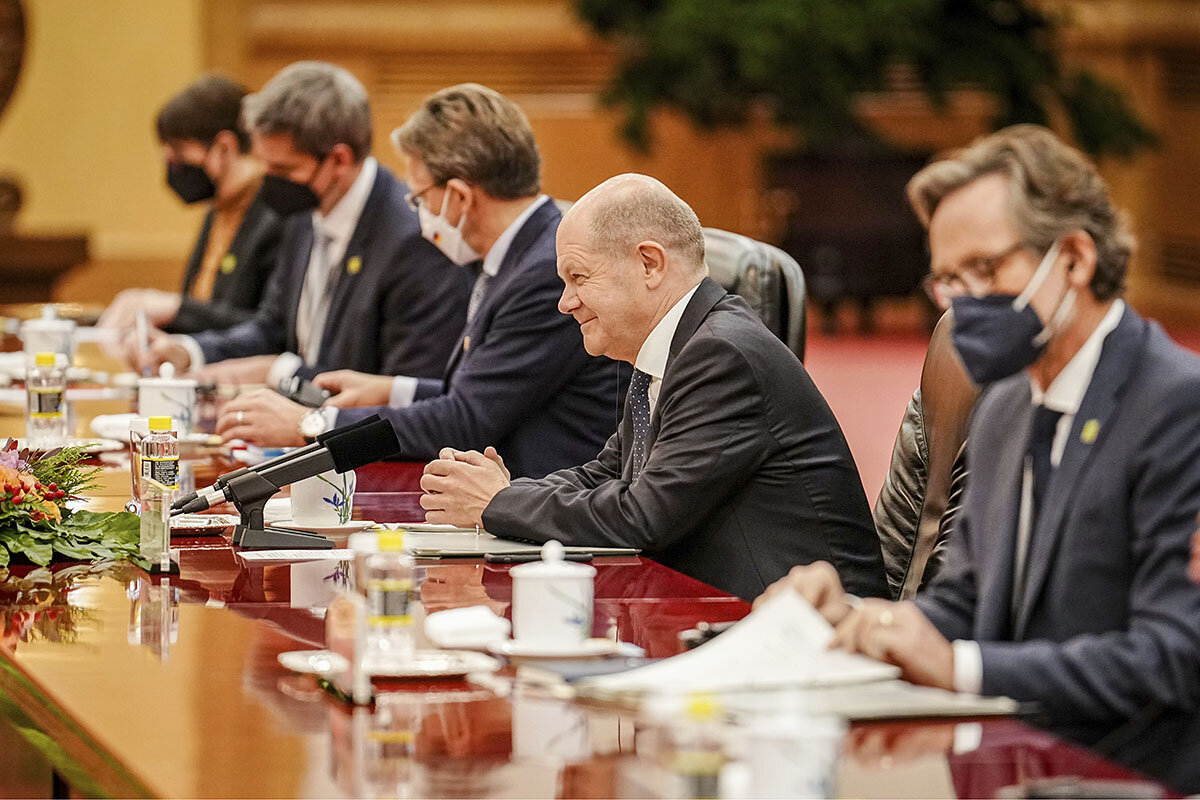Cooperative rivals: Biden seeks novel relationship with China
Loading...
| London
Here’s a phrase I never expected to write: Joe Biden will be spending the next few days channeling his inner Gwyneth Paltrow.
It was Ms. Paltrow who popularized the phrase “conscious uncoupling” to describe the careful unwinding of her 12-year marriage to British rock star Chris Martin, with the aim of avoiding collateral damage to each other, their family, and friends.
But it might well apply now to the U.S. president, who is due to meet Chinese leader Xi Jinping for the first time next week, as Mr. Biden begins the delicate task of recalibrating Washington’s relationship with Beijing at the most consequential summit of his presidency.
Why We Wrote This
A story focused onAt his first meeting with Xi Jinping next week, will President Joe Biden be able to start uncoupling the U.S. and Chinese economies without threatening the whole edifice of their trade relationship?
The meeting, at the G-20 summit on the Indonesian island of Bali, comes at a critical juncture. After decades of increasingly intertwined trade ties, China has emerged as America’s main economic, political, and security rival.
Mr. Biden will be hoping that despite this rivalry, both sides will recognize that a bitter, chaotic divorce – the geopolitical equivalent of sulking and shouting, slamming doors, and throwing dinner plates – is in neither nation’s interest.
Especially now, as the United States, China, and the world navigate a range of critical issues, such as climate change, Russia’s war on Ukraine, and the prospect of a general economic slowdown.
Since the earliest days of his presidency, Mr. Biden has made clear the political understanding on which he wants to build future ties with Beijing: that while the U.S. sees China as a competitor and rival, the countries should still be able to communicate and, where possible, cooperate on areas of mutual interest.
This approach has had mixed results so far. Washington has not found China ready to engage with it on climate policy. But on the other hand, Beijing has largely refrained from helping Moscow evade Western sanctions.
Meanwhile, an “unconscious uncoupling” has already begun – the result of a range of political and economic factors in both China and the West.
In China, Mr. Xi has sidelined figures associated with the country’s economic reform and opening to the outside world. He is focusing instead on economic self-sufficiency, especially in high-tech areas, and the projection of Chinese power abroad.
He’s also imposed a “zero-COVID” policy with lockdowns and mandatory testing for millions of Chinese citizens across the country. That has contributed to a serious slowdown in China’s economy. It has also upended the supply chains on which major businesses in America and other Western countries have come to rely.
That has been a stark reminder of the degree to which Western economies have come to depend on China. The price that Europe is now paying for its reliance on oil and gas from another autocratic regime, in Moscow, has further highlighted the risks of such an approach.
Some Western companies have been uncoupling on their own, cutting back on planned investment projects in China as a result. Even companies with major manufacturing partnerships may start recalibrating. Apple, for example, has shifted the manufacture of some iPhones to India. A COVID-19 lockdown of its main manufacturing hub in China now threatens to limit handset sales during the holiday season.
Still, unwinding reliance may prove complicated for a number of governments.
Germany’s Chancellor Olaf Scholz faced criticism not only from fellow European Union states, but his own Cabinet and security services, for flying to China last week to meet Mr. Xi. The reason he went: the importance for Germany’s automobile industry of sales in China.
Australia has no doubt about the security challenge Mr. Xi’s China poses for its Asian neighbors: It has decided to base nuclear-capable U.S. bombers on its territory. Still, despite punitive Chinese tariffs on a range of Australian goods, exports to China remain key to its economy.
The conundrum facing Mr. Biden is that both the U.S. and the wider world economy could suffer significantly from an across-the-board uncoupling. Washington is determined to impose stricter national security criteria on its trade with China. How can it do this without threatening the whole edifice of a trade relationship worth $655 billion a year, and thus damaging an already fragile economy?
Mr. Biden recently set new rules barring the sale to China of advanced microchips and chip-making technology. His aim is unequivocal: to frustrate Mr. Xi’s campaign to catch up with, and then outpace, the U.S. in high-tech innovation.
Still, in explaining the new restrictions, Alan Estevez, a senior Commerce Department official, added a dash of Gwyneth Paltrow-like consciousness. The aim was not, he said, to hold back China’s economy, nor to undermine the U.S.-China trade relationship.
At the same time, Mr. Estevez does not appear to foresee a very sophisticated future for the Chinese microchip industry. He had “no problem,” he said, with China retaining “a robust capability to make semiconductors to go into the airbags of cars.”
That is unlikely to impress Xi Jinping.








